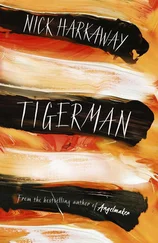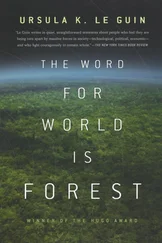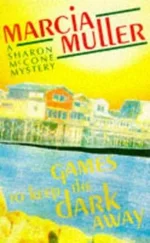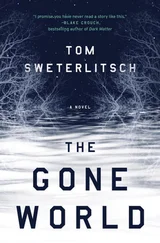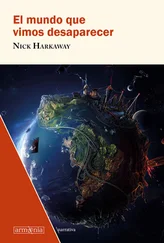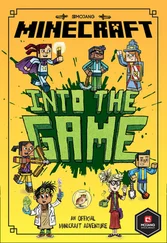Nick Harkaway - The Gone-Away World
Здесь есть возможность читать онлайн «Nick Harkaway - The Gone-Away World» весь текст электронной книги совершенно бесплатно (целиком полную версию без сокращений). В некоторых случаях можно слушать аудио, скачать через торрент в формате fb2 и присутствует краткое содержание. Жанр: Фантастика и фэнтези, Фэнтези, на английском языке. Описание произведения, (предисловие) а так же отзывы посетителей доступны на портале библиотеки ЛибКат.
- Название:The Gone-Away World
- Автор:
- Жанр:
- Год:неизвестен
- ISBN:нет данных
- Рейтинг книги:4 / 5. Голосов: 1
-
Избранное:Добавить в избранное
- Отзывы:
-
Ваша оценка:
- 80
- 1
- 2
- 3
- 4
- 5
The Gone-Away World: краткое содержание, описание и аннотация
Предлагаем к чтению аннотацию, описание, краткое содержание или предисловие (зависит от того, что написал сам автор книги «The Gone-Away World»). Если вы не нашли необходимую информацию о книге — напишите в комментариях, мы постараемся отыскать её.
The Gone-Away World — читать онлайн бесплатно полную книгу (весь текст) целиком
Ниже представлен текст книги, разбитый по страницам. Система сохранения места последней прочитанной страницы, позволяет с удобством читать онлайн бесплатно книгу «The Gone-Away World», без необходимости каждый раз заново искать на чём Вы остановились. Поставьте закладку, и сможете в любой момент перейти на страницу, на которой закончили чтение.
Интервал:
Закладка:
That is the least awful thing I read in Humbert Pestle’s secret file.
I AM in the corridor again, and I have not been blown up. I am walking back the way I came. I do not remember leaving the room. I know that I wanted to. I also wanted to be sick, but I think—I hope—that I managed not to do that. I am full of answers, but I don’t understand them. I still don’t know the why. And I no longer know where to look. I have seen the Core. I have seen the file. I just don’t get it.
Maybe I’m ignoring the obvious. Perhaps Pestle is insane. He seems to be: set the Pipe on fire to recruit Gonzo; risk the entire world for a chance to kill the Bey. And somewhere in there cause the Vanishings as well, if his cleat is anything to go by. The scales are not balanced, but maybe Pestle just hates Zaher Bey so much (and why? again) that he doesn’t care.
I have gone the wrong way somewhere. Elisabeth is tapping on the ceiling, tra-tratratra. This way.
I don’t go that way. I have seen something. In for a penny. One more room. The door is half-open, and there’s a soft light coming out, maybe a television screen or a computer. I look in.
The man sitting at the desk is huge. I do not immediately recognise him because he is so still. He is lit from a single monitor screen, a pale blueish luminescence which casts long shadows over his face. Always before when I have seen him, he has been speaking with his whole body, using his physicality for all it’s worth. Now he sits, slack, in this chair in this featureless box. His eyes are open, and he is looking straight ahead. It seems at first that he is dead. If so, he has gone into rigor in place; they will never be able to get him out of the chair without bolt cutters (the dirty secret of undertakers). On the other hand, with the muscle he has, I’d expect him to be more contorted. He should be all wrapped around himself, like a spider in the rain. He is not. If anything, he’s like a sleeper. If I lean my head, I can see his chest move slowly, in and out. Humbert Pestle is not dead. He has been put away. This is how he is when he is not the Boss. When he has no purpose. Humbert Pestle is a type A pencilneck, and this is what he is when there is no work to be done.
I think of Robert Crabtree and of the maps and graphs in the operations room, of the secret file and Humbert Pestle’s vacant eyes, and now I do understand. At last, in the cold light of the screen, I see the face of my enemy.
Chapter Sixteen
Fear and marine biology;
just like old times;
it all goes wrong.FEAR is an emotion with many shapes. It can be a thing of jolts and shudders, like an electric shock, or it can be like the tendril of cold night air which reaches you in your bed when all your doors and windows should be closed. It can come in the shape of a well-known footstep in the wrong place at the wrong time, or a foreign one in a familiar room. But all fear is connected, a susurrus which plays around you in the dark and brushes against your skin, pushes the hair back from your face like an uninvited guest, and slips away before you dare to open your eyes. Also, fear is sneaky. It establishes a foothold and sits, content. While you confront it, it is small and weak, and looks back at you with timorous eyes, so that you wonder how it could ever stir you for more than a moment. Turn your back, and it waxes, casting giant shadows and flickering in the corner of your eye, leaning lingeringly on the creaky floorboard. It inflates and bursts, propelling fragments of itself to the far corners of your mind, where they grow again until you are inundated, and you drown.
I am not afraid as I stare at Humbert Pestle. He is there, in front of me, and he does not see me. It’s like seeing the wolf padding through the forest: you know it is there, it’s just an animal, and it’s not coming your way. Good. I slip out, and down the corridor, and Elisabeth’s tratratra guides me to the grille. I am not afraid as we climb onto the roof and head back the way we came. I am not afraid in the moonlight as we winch ourselves back up, yard by yard, away from Pestle and his vacant gaze.
And then, once we are over the Jorgmund building, with its snake badge in silly neon, I make a mistake. I start to pick up the pace. I am impatient, and the longer we are exposed like this, the greater our risk. The consequences of discovery are very grave—no sense in taking more chances than we have to. I trot. He saw me. He will send men. They will follow, and they will catch Elisabeth, and it will be my fault. The trot becomes a run. Elisabeth is ahead of me, and they will take her and erase her and it will all be my fault. Then they will come for me, and do terrible things, and I will die and be gone, extinguished, after so little time to be at all. The sky yawns above me, and for a second it is a chasm into which I may fall, an impossible depth, and I am looking not up into it but down onto it, and the threads of gravity and atmosphere which tie me to it are very slender and I am very, very small.
Fear is not rational. A moment later the run becomes a sprint, and a panic, and I am afraid of everything I have ever been afraid of. I am afraid that I will be hauled up on charges for terrible crimes I have not committed, or that I have, and I will be an outcast and a pariah, and Old Man Lubitsch will shake his head and turn away, and be appalled. I am afraid that Elisabeth will despise me, leave me, attack me, and I will not know how to stop her without killing her and then I will be a murderer. I am afraid of falling, of fire, of torture and monsters and infestations of spiders and wild dogs and cancer and the End of the World (a proper one, without a sequel) and everything else I have imagined in the small hours between two and four, when unreasonable, improbable waking nightmares can attain solidity and bulk.
I overtake Elisabeth, grab her hand and drag her along with me, plunge and weave across the rooftops. She calls to me to stop, stop, and when I do it is because we have arrived, and I dive through the open door and into the pigeon loft and begin to pack. We cannot stay, cannot stop, not now, never again, until this is done. Fear has given way to horror. It is the animal in me, seeing the thing which is my foe, and that thing is not like me. The face of my enemy.
In the sea, there are creatures like this. Physalia physalis is an individual, but it is also a colony. It is a floating sack of gas composed of a million little polyps, of four different kinds. Some of them digest and some of them sting, and some of them are for breeding, and some for keeping the others from sinking down into the sea. I met a sailor once, a woman from Redyard, who had been stung by one. She said it was like being scraped with hot wire, and she screamed and drank down brine, but the worst part was being tangled in the tendrils of the monster, brushing against them and recoiling into more, and gasping, and swallowing them, being wrapped about and snuggled and invaded by something alien and awful which had no eyes and yet knew she was there.
The gas bag was barely as big as her head. It could no more consume her than it could get up and dance—but it was trying, oh yes, and if she sank, then she would die, and her assailant would devour her slowly, gram by gram. She had weals upon her arms and neck, livid scars like the marks of a whip or a brand, and she favoured one hand. The doctors said her survival was a miracle, that she must have a giant’s heart. She spoke as if she’d been smoking with every breath, her larynx coarsened by scars. When they pulled her out of the water, the thing came too, all blue-grey and appalling, half-liquid. On dry land it couldn’t move—no muscles at all. They unwrapped her from it and she spasmed away across the deck, but she wouldn’t let them throw it back. She made them keep it, and when she was well, weeks later, she burned it in her yard and vomited for two straight days. She didn’t drink; alcohol, she said, gave her dreams of polyp arms about her, and made her wake up screaming. Her husband put his thick, dry hands on her shoulders and stroked gently at the places where she was marked, and the revulsion faded from her as she relaxed against him.
Читать дальшеИнтервал:
Закладка:
Похожие книги на «The Gone-Away World»
Представляем Вашему вниманию похожие книги на «The Gone-Away World» списком для выбора. Мы отобрали схожую по названию и смыслу литературу в надежде предоставить читателям больше вариантов отыскать новые, интересные, ещё непрочитанные произведения.
Обсуждение, отзывы о книге «The Gone-Away World» и просто собственные мнения читателей. Оставьте ваши комментарии, напишите, что Вы думаете о произведении, его смысле или главных героях. Укажите что конкретно понравилось, а что нет, и почему Вы так считаете.

